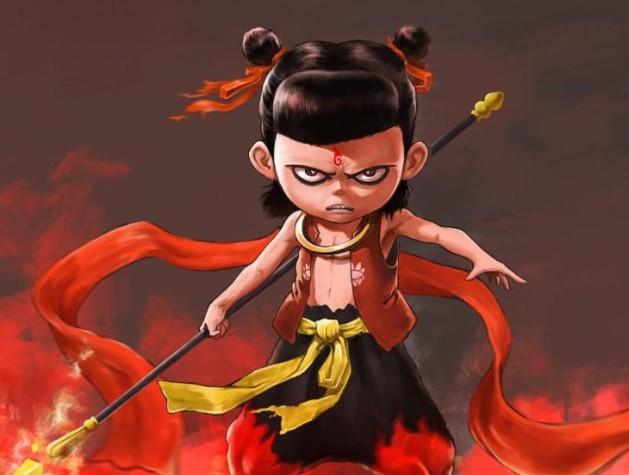
Nezha, a god in ancient Chinese myths and legends, is a Buddhist and Taoist protector. Flourishing in Taoism and folk beliefs, in Taoism the titles are Marshal of the Middle Temple, Master of Heaven, Great General of Weiling, etc., and is honored as Prince Ye, Third Prince, and Boy of Shansheng.
In addition, Nezha's main records are derived from the Yuan Dynasty religious mythological classics "Three Religions search for gods", and are active in many classical literary works such as the Ming Dynasty's series of divine and demonic novels such as "Fengshen Yanyi", "Journey to the West", "Journey to the South" and so on.
Mainly fixed in the legend of the sea slaying dragon, as well as the story content of the demon Voldemort and then becoming a fairy and entering the holy, the birth is strange, an artifact, can change three heads and six arms or three heads and eight arms; the lotus incarnation of the invincible evil, immunity to the virus plague, and the special dementor.
According to records, Nezha folk worship and worship mainly arose during the Tang and Song dynasties, and in the Yuan and Ming Dynasties, it has been included in the national festivals to enjoy the worship of public sacrifices, and is widely inherited on both sides of the Taiwan Straits and Southeast Asia.
In modern times, the image of Nezha often appears in various TV movies and some cartoon series or game scenes, and in the film and television, it mainly appears in costume mythological drama works as an anime protagonist or a live-action actor, and has become an eternal classic memory in the hearts of many generations of viewers.
However, careful people found that his father Li Jing was not an emperor, so why was Nezha called the "Third Prince"? Looking through the materials, I found that the answer was unexpected.
- The evolution of the title "prince"
The crown prince was the title of the successor of the ancient emperor, and was designated as the person who took the throne and the successor to the throne. Before Qin Shi Huang invented the title of "Emperor", others were called "Wang", such as the Shang Dynasty's King Of Lu, the Zhou Dynasty's King Wen, and the King of Wu. The heirs of these kings were called "princes." ”
After Qin Shi Huang was called emperor, in the Han Dynasty, the prince was divided into two meanings, the heir of the emperor was called "crown prince", and the heir of the princes was called "prince".
This distinction between the title of crown prince continued until at least until the Wei and Jin dynasties, after which it gradually began to completely separate the titles of crown prince and crown prince. The crown prince generally refers to the crown prince, and the crown prince is renamed "Shizi".
- Why is Nezha called the "Three Princes"
Li Jing, also known as "Li Tianwang", first appeared in classical mythological novels such as "Journey to the West" and "Fengshen Yanyi".
From these allusions, it can be known that in addition to being the general soldier of Chen Tangguan during the Shang Dynasty, Li Jing was also a disciple of the West Kunlun Du'er Zhenren, and then chose to worship the Lantern Daoist as a teacher.
Among the three generations of disciples of the Expository Teachings, the qualifications are also relatively old. After cultivating, he was ranked as a xianban, and was named the protector of the Spirit Mountain, responsible for controlling the three armies of the Heavenly Court.
Because his left hand holds the "Linglong Pagoda", he is known as the "Tota Heavenly King" by the people, but do not underestimate the position of Chen Tangguan's general soldier, who not only holds a heavy army, but also belongs to a powerful feudal official.
Moreover, Chen Tangguan is not an ordinary place, it is bordered by the Dragon Palace, and the role of Chen Tangguan is similar to the existence of the Dragon Palace. Therefore, it is concluded that Li Jing is not an emperor, but his status is not inferior to that of an emperor.
In addition, during the Shang Dynasty, "prince" did not have a special meaning, so it was not impossible for Nezha to be called "three princes".
In Journey to the West, Li Jing gives people the feeling that he is showing the gate of the Heavenly Court, but he is also a general on the side of the town. He was also the general who led the Four Heavenly Kings, that is to say, Li Jing was the highest-ranking military general in the Heavenly Court.
Historically, calling the supreme ruler the Heavenly King is synonymous with the Son of Heaven, that is, the Heavenly King is essentially the same as the so-called Emperor in later generations. Therefore, it is also reasonable that Nezha is called the "Third Prince".
Nezha is the third child in the family, the eldest brother is called the eldest prince Jinzha, the second brother is called the second prince Muzha, and Nezha is the third son, so it is called "the third prince Nezha." ”
However, there are many folk legends about why Nezha is called the "Three Princes", but Nezha is not a historical figure, so it is difficult to pursue the historical truth.
Statement: The content text is original, unauthorized can not be reproduced, some of the pictures come from the network, if there is infringement, please contact the notice to delete, thank you!